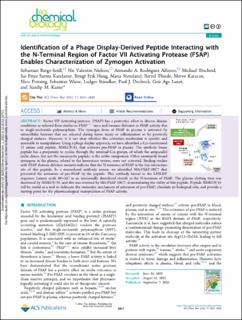Identification of a Phage Display-Derived Peptide Interacting with the N-Terminal Region of Factor VII Activating Protease (FSAP) Enables Characterization of Zymogen Activation
Berge-Seidl, Sebastian; Nielsen, Nis Valentin; Alfonso, Armando A Rodriguez; Etscheid, Michael; Kandanur, Sai Priya Sarma; Haug, Bengt Erik; Stensland, Maria; Thiede, Bernd; Karacan, M; Preising, N; Wiese, S; Standker, L; Declerck, Paul J.; Løset, Geir Åge; Kanse, Sandip
Journal article, Peer reviewed
Published version

Åpne
Permanent lenke
https://hdl.handle.net/11250/3029342Utgivelsesdato
2022Metadata
Vis full innførselSamlinger
- Department of Chemistry [433]
- Registrations from Cristin [9791]
Sammendrag
Factor VII Activating protease (FSAP) has a protective effect in diverse disease conditions as inferred from studies in FSAP–/– mice and humans deficient in FSAP activity due to single-nucleotide polymorphism. The zymogen form of FSAP in plasma is activated by extracellular histones that are released during tissue injury or inflammation or by positively charged surfaces. However, it is not clear whether this activation mechanism is specific and amenable to manipulation. Using a phage display approach, we have identified a Cys-constrained 11 amino acid peptide, NNKC9/41, that activates pro-FSAP in plasma. The synthetic linear peptide has a propensity to cyclize through the terminal Cys groups, of which the antiparallel cyclic dimer, but not the monocyclic peptide, is the active component. Other commonly found zymogens in the plasma, related to the hemostasis system, were not activated. Binding studies with FSAP domain deletion mutants indicate that the N-terminus of FSAP is the key interaction site of this peptide. In a monoclonal antibody screen, we identified MA-FSAP-38C7 that prevented the activation of pro-FSAP by the peptide. This antibody bound to the LESLDP sequence (amino acids 30–35) in an intrinsically disordered stretch in the N-terminus of FSAP. The plasma clotting time was shortened by NNKC9/41, and this was reversed by MA-FSAP-38C7, demonstrating the utility of this peptide. Peptide NNKC9/41 will be useful as a tool to delineate the molecular mechanism of activation of pro-FSAP, elucidate its biological role, and provide a starting point for the pharmacological manipulation of FSAP activity.
